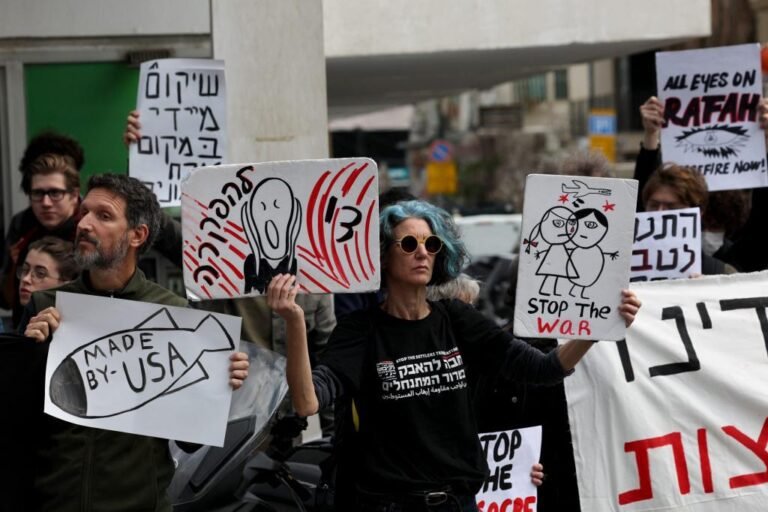Despite being on shaky ground, ESG investing is attempting to win favor among American corporate progressives by advocating for divestment from Israel during its ongoing conflict, as reported by the Post. This trend is sadly not surprising.
The extreme left has a longstanding animosity toward Israel, as evidenced by the disturbing pro-Hamas rallies held on university campuses following the tragic events of October 7.
President Joe Biden has aligned himself with the more progressive faction of his party to criticize Israel and pause necessary actions against terrorists in the Gaza Strip.
Veteran economist Jerry Bowyer, a known opponent of the woke culture, explains that the dwindling supporters of ESG (Environmental and Social Governance Investing) are scrambling to remain relevant. He suggests they are aligning with anti-Israel sentiments as a desperate measure. Shareholder Advocate.
Bowyer highlighted a series of “proxy” strategies put forth by investment advisors and activists aiming to sway corporate governance at some of the largest and most influential companies in the U.S.
Their agenda clearly aims to push companies to rethink their business associations with Israel, intensifying their efforts in the process.
Utilizing corporate “proxy processes” for this purpose is particularly unsettling.
It’s important to remember that listed companies hold annual shareholder meetings from April to June, marking this time as “proxy voting season.” During this three-month window, companies evaluate various proposals related to governance, typically with the goal of enhancing shareholder value.
However, in recent years, proxy voting has been overtaken by ESG initiatives, where investors and advocates have coerced companies into making absurd left-leaning requests. My recent book, Go Woke, Go Broke, explores how the fixation on ESG has eclipsed shareholder value, leading energy firms to prioritize wind turbine investments over oil exploration, contributing to today’s inflation crisis.
This preoccupation with diversity initiatives has barred qualified white men from corporate boards and led to vendor selection criteria based on race and gender.
Transgender activist Dylan Mulvaney became the advertising face for Bud Light due to ESG influences, while Target’s clothing selection includes gender-neutral onesies and tuck-friendly swimsuits for transitioning individuals, mirroring Disney’s unusual fixation on same-sex portrayals in children’s programming.
Corporate Backlash
As a reaction, there has been significant pushback against corporate America’s alignment with the progressive cultural shift. Companies like Budweiser’s AB InBev, Target, and Disney are feeling the impacts on their brands and strive to regain their footing.
ESG investing is proving costly, lacking solid profit generation, prompting investors to withdraw and major asset managers to feel pressure to retreat from this sector.
Yet, ESG is far from extinct. As noted by Bowyer, the current state of ESG resembles the German military’s last desperate counteroffensive at the war’s end, attempting to salvage a stalemate.
Bowyer discovered multiple anti-Israel shareholder proposals submitted recently as significant companies like Amazon, Raytheon Technologies, and Lockheed Martin prepare for proxy season.
For example, a proposal filed for Amazon’s 2024 proxy vote claims that “Amazon Web Services (AWS) serves various government clients with a history of human rights violations,” including accusations against the Israeli government regarding the treatment of Palestinians.
This submission alleges that Israel’s use of AWS has facilitated “illegal settlements and racial segregation,” and suggests that it heightens the risk of human rights abuses among AWS customers.
Bowyer learned about this proposal from the Interface Center on Corporate Responsibility, which bills itself as a coalition of over 300 global institutional investors managing more than $4 trillion in assets, pushing for better environmental and social accountability from major corporations.
This sounds promising, but I questioned a representative from the center regarding their stance on Israel’s right to utilize AWS technology for self-defense against threats like the October 7 massacre.
In response, she claimed, “We are not anti-Israel. Our members call for heightened human rights due diligence from companies operating in conflict-ridden, high-risk areas, and considering the ongoing war, it’s conceivable that Israel will appear in our members’ proposals.”
Moreover, she noted that the center itself does not endorse any shareholder proposals, insisting it is incorrect to attribute specific views to Israel.
But if the Center does not back Amazon’s unusual proposal, why showcase it on their website?
She did not provide an answer.
Next, I reached out to the lead submitter of this proposal, the American Baptist Home Mission Societies, but have yet to receive a response.
Overall, these developments reinforce the notion that the demise of ESG cannot come soon enough.

